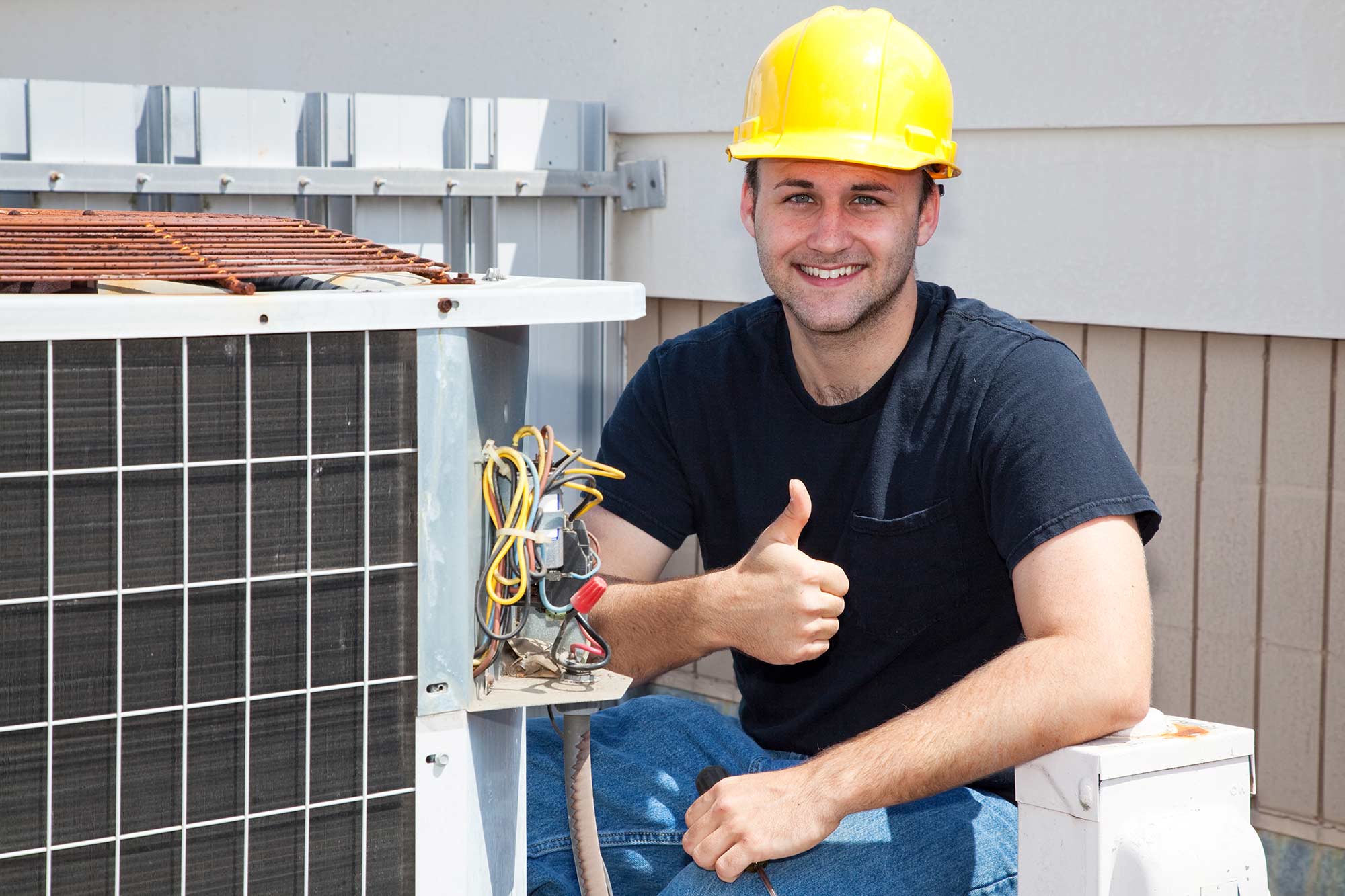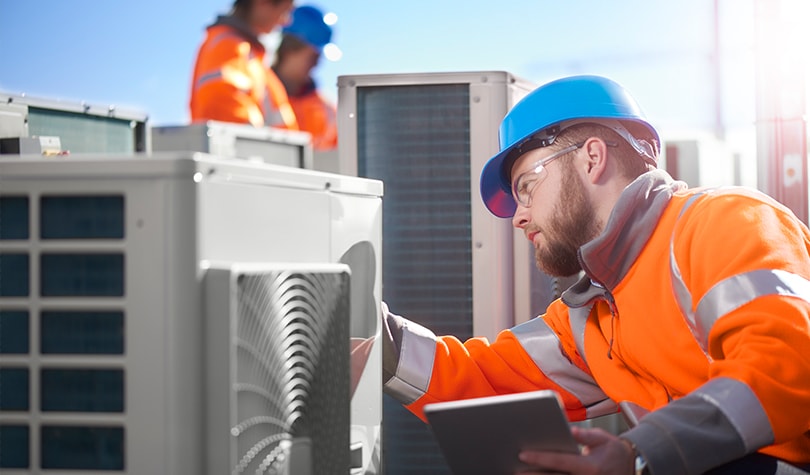Everything about Heating And Cooling: Identifying Common Issues and Effective A/c Repair Service Methods
Cooling and heating systems are vital for preserving indoor convenience. Recognizing their elements and performance is vital for determining common issues. Homeowners usually encounter issues such as inadequate air conditioning, strange smells, or climbing energy costs. These signs can indicate underlying problems that may require focus. Discovering DIY troubleshooting strategies can be useful, but knowing when to look for specialist assistance is equally essential. What actions can be taken to guarantee long-lasting efficiency?
Comprehending Your A/c System: Components and Functionality
An a/c system, usually thought about the backbone of interior climate control, is composed of a number of vital elements that collaborate to control temperature and air quality. The main elements consist of the home heating system, air flow system, and a/c system. The heating device, normally a furnace or central heating boiler, generates warmth throughout colder months, while the a/c device cools interior rooms throughout the summer.

Usual A/c Troubles Property Owners Encounter
Homeowners usually deal with several usual heating and cooling troubles, including irregular temperature circulation throughout their space. In addition, unusual sounds during operation can show underlying problems that call for interest. Resolving these worries without delay is crucial for keeping excellent system efficiency.
Inconsistent Temperature Level Distribution
Numerous houses experience the discouraging concern of inconsistent temperature circulation, where specific rooms feel annoyingly cozy while others remain as well cool. This problem commonly emerges from a range of elements, consisting of inadequate insulation, blocked vents, or an incorrectly sized cooling and heating system. When ducts are not effectively secured or when furnishings obstructs air flow, some rooms may get not enough air conditioning. Additionally, thermostat placement can significantly affect temperature regulation; a thermostat located in a sunlit location may misstate the total temperature of your home. Regular maintenance, including cleaning filters and making certain ductwork is clear, can help relieve these inconsistencies. Property owners might additionally consider zoning systems to better control temperatures throughout various locations of the home, advertising a more comfy living setting.
Unusual Sounds During Procedure
When a cooling and heating system runs, unusual noises can suggest underlying concerns that call for attention. Homeowners might encounter an array of sounds, such as grinding, squealing, or hissing. Grinding noises usually indicate worn-out bearings or parts, while squealing can recommend loose belts or components requiring lubrication. Hissing may indicate a refrigerant leakage, which can endanger the system's performance. Furthermore, banging sounds could indicate loose ductwork or an issue with the blower follower. Each of these noises functions as a caution, triggering house owners to examine further. Ignoring these indicators can result in more substantial issues and expensive repair services. Routine maintenance and punctual attention to unusual sounds can boost system long life and efficiency, making certain a comfortable living setting.
Indications That Indicate Your Air Conditioning Demands Repair Work
Just how can one tell if their air conditioning system needs repair service? Several signs might indicate underlying issues needing professional interest. Initially, if the a/c fails to cool the room properly, it may suggest a cooling agent leak or compressor malfunction. In addition, an increase in energy costs without corresponding usage adjustments could indicate ineffectiveness in the system. Homeowners must additionally look out to unusual scents rising from the unit, which could suggest mold and mildew development or electric issues. If the Air conditioner regularly cycles on and off, it might be an indication of a malfunctioning thermostat or various other mechanical troubles. Finally, the presence of water pooling around the unit can suggest a blocked drainpipe line. Acknowledging these indications early can conserve money and time, ensuring that the air conditioning system operates successfully and effectively.
Do It Yourself Troubleshooting Techniques for Heating And Cooling Issues
When dealing with heating and cooling issues, homeowners can utilize several DIY fixing strategies to recognize the problem. Key methods consist of examining thermostat setups, inspecting air filters, and examining drain problems. These steps can aid identify common breakdowns prior to looking for specialist support.
Inspecting Thermostat Settings
What actions their website should house owners take to assure their thermostat settings are correct? Initially, they ought to validate the thermostat is set to the preferred temperature level and mode, whether home heating or air conditioning. Inspecting for a clear display and validating the thermostat is not set to "hold" or "trip" mode is necessary. Property owners should additionally verify that the thermostat is degree and installed in an area without drafts, direct sunshine, or other temperature level influences. In addition, altering the thermostat can aid give precise analyses. If the thermostat operates batteries, replacing them might fix any problems. By methodically examining these factors, home owners can typically recognize and correct thermostat-related problems, promoting ideal cooling and heating system performance.
Inspecting Air Filters
Air filters play an essential function in keeping perfect a/c efficiency. They trap dust, allergens, and various other fragments, guaranteeing clean air blood circulation. Over time, filters can come to be clogged, decreasing air flow and efficiency. To examine air filters, individuals ought to initially find the filter, usually located in the return duct or near the furnace. Once located, they must examine the filter's problem-- if it shows up unclean or discolored, it likely needs replacement. Many filters need altering every 1-3 months, depending on use and ecological elements. Regular assessment and timely substitute of air filters not only improve air top quality yet also prolong the life expectancy of a/c systems, preventing prospective breakdowns and pricey fixings.
Evaluating Drainage Issues
How can property owners properly determine and address drain issues within their heating and cooling systems? They need to evaluate the condensate drain line for clogs or clogs, which can lead to water accumulation. House owners may utilize a wet/dry vacuum to get rid of any type of debris blocking the line. Next, examining the drain frying pan for rust or leaks is vital, as a damaged pan can create water to overflow. Routine cleansing of the drain line with a mixture of vinegar and water assists prevent future obstructions. Additionally, ensuring appropriate incline of the drain line advertises effective water circulation. If these DIY methods do not resolve the problem, seeking advice from a professional cooling and heating technician might be necessary to stay clear of potential water damage and system failing.
When to Call a Professional for A/c Repairs

While some AC problems can be managed via do it yourself approaches, there are circumstances where calling a specialist becomes necessary. House owners should look for skilled assistance when they encounter relentless troubles, such as inadequate air conditioning, unusual sounds, or uncommon smells rising from the unit. These symptoms may suggest much deeper problems that call for specialized understanding and devices to diagnose and repair correctly.

Preventative Maintenance Tips for Cooling And Heating Durability
Normal preventative maintenance can considerably boost the long life of a/c systems. Homeowners ought to set up annual inspections by licensed specialists to assess system performance and recognize potential concerns. Consistently transforming or cleaning up air filters is essential, as this assurances appropriate air movement and decreases pressure on the system. Additionally, inspecting and securing ductwork protects against energy loss and enhances general performance.
It is also advisable to keep the outdoor unit ac installation contractor free from debris and plants, enabling peak air flow and heat exchange. House owners should examine the condensate drainpipe for blockages to avoid water damages and mold and mildew growth. Moreover, keeping ideal thermostat setups and utilizing programmable choices can enhance energy efficiency. Recording maintenance tasks aids track solution background and can assist in identifying recurring concerns. By complying with these preventative steps, individuals can make the most of the performance and life expectancy of their heating and cooling systems
Regularly Asked Concerns
How Frequently Should I Change My Cooling And Heating System Filters?
Heating and cooling system filters should normally be replaced each to three months, relying on usage, filter kind, and environmental aspects. Regular substitute helps preserve efficiency and air high quality, ensuring peak system efficiency throughout the year.
What Dimension HVAC System Do I Need for My Home?
To figure out the ideal HVAC system size for a home, one should take into consideration square video, insulation quality, and local climate. Consulting an expert can assist assure optimal performance and convenience for the specific living space.
Exist Eco-Friendly Cooling And Heating Options Available?
Yes, environmentally friendly heating and cooling options are offered, including energy-efficient heat pumps, solar-powered systems, and geothermal heating. These options lower energy consumption and ecological influence, promoting sustainability while maintaining effective environment control for domestic and business rooms.
Exactly How Can I Improve My cooling and heating System's Power Effectiveness?
To improve cooling and heating energy efficiency, one can routinely keep the system, seal air leakages, install programmable thermostats, make use of energy-efficient filters, and assurance adequate insulation throughout the home to minimize energy intake and enhance efficiency.

What Is the Average Lifespan of an A/c System?
The typical life expectancy of an a/c system typically ranges from 15 to 25 years, depending on factors such as maintenance, use, and the quality of installation. Regular upkeep can considerably prolong its functional longevity.
Conclusion
In recap, a thorough understanding of HVAC systems empowers ac repair property owners to determine typical problems and address minor troubles successfully. Acknowledging indications of malfunction, employing do it yourself fixing methods, and prioritizing normal upkeep can improve system efficiency and effectiveness. When faced with intricate repair work, enlisting specialist help is important to assure safety and security and long life. By cultivating recognition and aggressive treatment, individuals can delight in a comfortable indoor setting while minimizing unanticipated prices associated with cooling and heating failures.